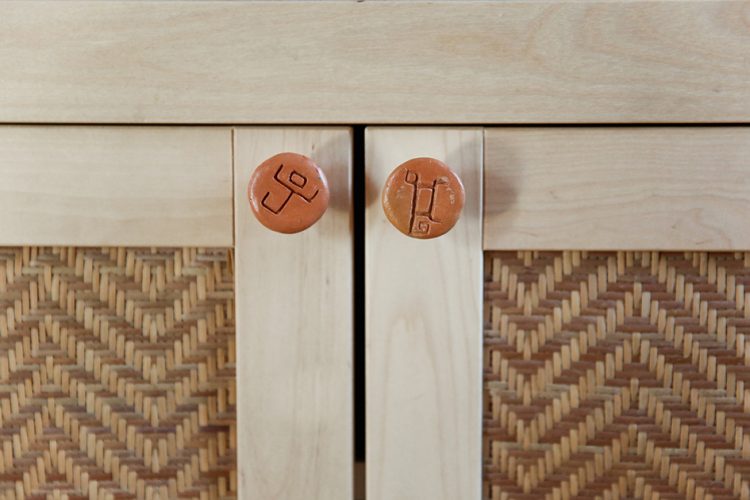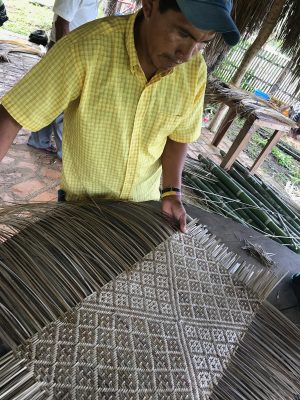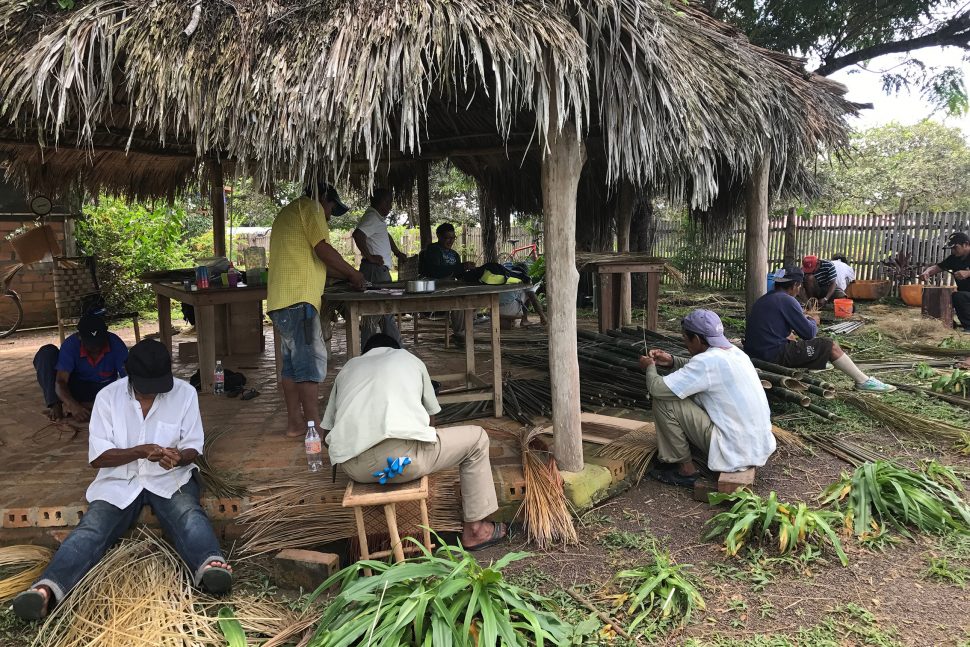Headquartered in Yupukari, North Rupununi, décor company Wabbani has embarked on a social mission by helping indigenous artisans to produce “culturally-authentic” accessories for customers across the world and it has set its sights on establishing a partnership with global furniture retailer IKEA.
The venture follows a recent partnership between Chief Executive Officer (CEO)/Founder of Wabbani Alice Layton and Co-founder Paul Dinkins, both of whom are committed to growing their social enterprise, while preserving threatened cultures and habitats, supporting artisan livelihoods, and sharing revenue with the maker communities.

Dinkins, who made his first trip to Guyana this past week to better understand the dynamics of the people and passion involved, told Sunday Stabroek that Wabbani is an Arawak word for “platform” and is particularly used by hunters in the forest. He explained that the use of the word Wabbani is no mistake since they see the company as a “platform” to connect remote artisans with customers.

At present, they have an e-commerce site (http://wabbani.com/) they and are trying to solidify a partnership with Swedish-founded multinational furniture giant IKEA to possibly incorporate their handmade Rupununi accessories and add-ons into their designs.
Dinkins explained that the idea for Wabbani came from Layton, who travelled to Guyana in 2005 to help undertake research on the Black Caiman.
Not long after, Caiman House, a guest house, was established and residents in the village started making hand crafts to decorate the newest addition to the village, thus presenting Layton with an idea to showcase Indigenous craftsmanship.
More than a decade would pass before Dinkins met Layton at the University of Washington, where he was pursing his Master’s in Business Administration (MBA) and serious consideration was given to the venture.
He explained that Layton, who is also an educator and social worker, had pitched the idea to a team of four MBA students, including himself.
“So, for the class we had to come up with a business plan and then after the class was done, we called it a social enterprise so the idea sounded great and I asked her if I can come on board and together we formed a limited liability company (LLC),” Dinkins said.
“We decided to do that rather than a non-profit or NGO just because we hope to have investors that can help us grow it and we like the idea of doing business for good and so we hope that we can be an example of that,” he added.
In February, 2018, the business was officially legalised, having been incorporated in the US.
“The idea of the business is to make accessories and add-ons for stuff that IKEA sells. We can also do other custom stuff but IKEA is such a big brand that we think we can use them to build our name,” Dinkins said.
Preserving culture and sustaining income
Additionally, Dinkins said the company should be seen as a platform for the Indigenous People and their handcrafted goods.
“The whole goal of why we’re doing this is to help build capacity for the Indigenous People so that they could potentially run their own businesses or increase their income and quality of life. At the same time, we want to help protect the Rupununi, another one of our goals is to have the Mocuru plant, a bamboo-like reed, which is what the panels are made of, cultivated on a large scale as a crop and we feel that we can help protect the wetlands in that regard. It’s a holistic approach, we are trying to protect the environment, build capacity, economy,” he noted.
Wabbani’s inaugural line was launched in April, 2018 and featured accessories such as river clay knobs, cotton lampshade slipcovers, and handwoven panels that can be added to cabinets, all handmade by artisans from the Rupununi.
Each product reflects a cultural aspect of the Indigenous People; featured on the river clay knobs are animal petroglyphs, while the panels, which are made from Mocuru, are woven in patterns called Deer Trail, Diamondback and Anaconda.
Dinkins said they have not yet placed a major focus on advertising.
According to the company’s website, the decision to make Wabbani a for-profit company stems from the mission to create not only fair-wage employment, but also to be able to attract investments for scale, thereby generating significant funds for community development.
Currently, they are expected to set aside 2.5% of revenue (not profit) to be returned annually to participating communities, so they can build their own capacities to manage the development they choose.
While Yupukari is considered the company’s headquarters, it is also working with several satellite villages, including Fly Hill, Quatata, Kaicumbay, Katoka—which is said to be the biggest neighbouring village—Semonie and Capybara.
According to Dinkins, the artisans have also been able to benefit from the expertise of Howard Teller, a US designer who has experience designing hand crafted goods for large US companies.
“He has the expertise to help use the Makushi designs and materials to come up with something that is sellable in the US or the global market,” Dinkins said.
“There is a design called dessert modern and we kind of fit into that and I think people in the US are willing to pay more for handcraft that allows them to connect to the story,” he added.
At present, there is said to be twelve artisans working on the project but several more have already been recruited by Layton for when there is more work to get done.
Meanwhile, Dinkins said while he hasn’t heard the feedback for himself, he believes that residents are excited since the project helps to preserve their culture while creating a sustainable income.
Similar sentiments were shared by Toshao of Yupukari Russian Dorrick, who said though development is important, Indigenous Peoples should not neglect their culture. He noted that this business venture seeks to ensure that the culture of the Makushi is preserved, while offering much needed income.
However, the Rupununi is only the start for Wabbani as there is hope that the company will in the next five years be in five continents with at least 20 product lines.
“My idea is that we are building our logistics and supply chain… there are co-ops out there that have been established and in the future we hope to make those connections rather than starting from the beginning,” Dinkins said.
“Guatemala has some beautiful fabric that we can probably use to make slip covers for chairs and so on so this is our primary base. This isn’t going to be fulltime depending on how much demand we have,” he added.
Locally, he hopes that persons here would have a similar interest in purchasing products of this kind, while in the meantime they will continue to work on having an official agreement with IKEA.









